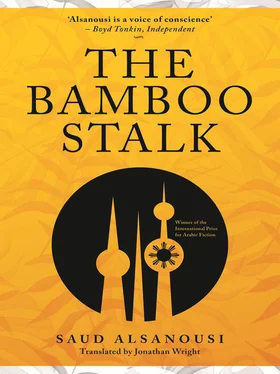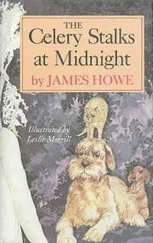‘So where are you from then?’ I asked inquisitively.
‘Bidoon,’ he answered straight off.
‘Really? I thought you were Kuwaiti,’ I said, uncertain what he meant. He didn’t offer any further explanation. ‘Bidoon? I’ve never heard of that country,’ I added.
Ghassan still didn’t speak. ‘Is Bidoon one of the GCC states?’ I asked with my usual stupidity.
Ghassan laughed, but it sounded like crying.
Through Ghassan I met a new and special type of person. A rare species. I discovered people who were stranger than the tribes of the Amazon or those African tribes that are discovered from time to time. They were people who belonged where they didn’t belong, or didn’t belong where they did belong. The idea was hard for me to grasp. I tired Ghassan out in my quest for an explanation. After many attempts to simplify the concept, my mind managed with difficulty to digest it.
‘But you went abroad on that plane that was hijacked that day!’ I told him.
‘Things were rather less complicated in those days than they are now,’ he replied, with a smile that I couldn’t explain.
I went over all the information I had heard about Ghassan from my mother. ‘But you’re a soldier,’ I said, pressing him to explain.
‘I was, once upon a time,’ he replied.
I pestered Ghassan with questions till I knew everything about him, though that doesn’t necessarily mean I understood everything. The sadness on his face was because of a label that had been stuck on him and that he couldn’t shake off. He was a bidoon — a term I grew to hate. I didn’t really understand the term even after Ghassan translated it for me. ‘Without nationality,’ he said, ‘born that way.’ If he had been a sardine born in the Atlantic, he would have been an Atlantic sardine. If he had been a bird in the forests of the Amazon basin, he would have been an Amazonian bird. But although Ghassan’s parents were born in Kuwait, and he too was born in Kuwait, although he knew no other country, had served in the army and defended the country when it was under occupation, he was still a bidoon.
Bidoon. He had five Kuwaiti brothers and sisters. They had escaped while he had fallen down some legal crack.
‘For God’s sake, Ghassan, what’s the complication?’ I asked. He laughed, as if his experience was nothing to cry about. ‘You and your parents were born here. Your brothers and sisters are all Kuwaiti. You had a job in the army. You helped my father, a Kuwaiti, defend Kuwait, and yesterday, and I apologise for intruding, I saw you crying at the death of the Emir. And in spite of all that. .’
‘Isa!’ he broke in. ‘All these questions of yours have stopped you asking about your father.’
I didn’t say a word. I didn’t have any feelings for my father that mattered.
‘Rashid loved you, Isa. He was always talking about you,’ Ghassan said.
Deep inside me, a strange feeling for my father stirred. ‘Was my father really like that?’ I asked.
‘More than you imagine.’
I hesitated before asking my next question. ‘So why didn’t he let me stay? Why did he get rid of me?’
Ghassan smiled. The man had a strange face. When you find a smile on a sad face it’s impossible to predict what the person plans to say. ‘OK,’ he said. He was still smiling. He also gave a long sigh. ‘There’s someone you care about, someone you love and worry about, and that person faces two options and for some reason he doesn’t have the right to choose,’ he said, turning to me and pointing at me with his finger. ‘You, only you, can decide.’
I nodded and Ghassan continued. ‘Either he’s going to be thrown into Hell or into a bed of thorns. Which would you choose for him?’
‘The thorns of course,’ I answered without thinking.
Like someone who has just won a bet, Ghassan gave me the thumbs-up sign. ‘That’s what Rashid did,’ he said.
3
Ghassan and I built up a close relationship in the month I spent in his little flat, where I felt so claustrophobic. I wasn’t used to living like that. In Cheng’s flat, although it was tiny and quiet, I at least had the window overlooking the Seng Guan Temple. But from among the windows in Ghassan’s flat, although there were plenty of them, I never found one that looked out on anything interesting, other than that bitter feeling of alienation towards the country and the people.
Ghassan went to work every morning while I stayed at home looking for ways to kill time. All the books on the shelves on the wall were in Arabic. The newspapers and magazines that Ghassan kept were also in Arabic. One morning I started browsing through them, looking at the pictures. In every magazine and every newspaper there was always one or more photos of Ghassan. That’s why he had kept those copies. There was plenty of writing under the pictures and I wondered what it said, what was written about him. He told me later that these newspapers and magazines were like his personal archives, including some of his poems and reviews of them, newspaper interviews he had given and press coverage of seminars and discussions in which he had taken part.
One evening I asked him to read me something he had written. He looked at my face with interest. ‘Read you one of my poems? In English? I never thought of that,’ he said. I was delighted when he pulled a piece of paper out of his desk and put his glasses on the end of his nose. ‘That sounds like a wonderful idea. Just give me some time, Isa. I’ll translate a small passage,’ he said. He started writing on the paper with a pencil. It didn’t take him long. He lit a cigarette. ‘I can’t talk without some smoke to go with my words,’ he joked. He cleared his throat, then started reading in English in a beautiful voice, softly at times and sometimes more loudly. He was waving his arms around melodramatically and using facial expressions to reinforce the effect.
I was very moved by Ghassan’s performance and was almost crying. He finished reading and looked at me. ‘What do you think?’ he said.
I was embarrassed. The words of his poem were indeed English but they didn’t include a single meaningful sentence.
‘To be honest,’ I began, hesitantly. ‘I didn’t understand anything.’
Ghassan nodded his head. ‘If you had said anything different, I would have known you were lying,’ he said, then paused. ‘Because I didn’t understand anything of what I said either,’ he added.
He roared with laughter, blowing cigarette smoke from his mouth and nostrils. I laughed too, and examined his face.
I wished I could read what Ghassan had written, or understand it when it was read, as easily as I could read his face.
* * *
‘There are lots of pictures of your father in that drawer,’ Ghassan said one morning before leaving for work, pointing at the drawer of his desk. Then he took ten dinars out of his pocket and gave them to me. ‘On the top of the desk, you’ll find the telephone numbers of some restaurants, if you don’t like what I have in my kitchen,’ he added.
I had never thought about whether I liked a particular food or not. As far as I was concerned, the function of food was just to stave off hunger. White rice and soya sauce served the purpose. My only problem at the time was with the water. It had a different taste from the water I was used to drinking in the Philippines. Ghassan laughed when I said one day, ‘The water there is nicer.’ He bought me two bottles of mineral water but it still wasn’t as nice as the drinking water I was used to.
When Ghassan went out, I kept thinking about the drawer where he said the pictures of my father were.
Years earlier, when my mother used to show me pictures, she had been trying to help me find out about a man I was going to meet one day. Now that the man was dead, I had a strange feeling about seeing pictures of him. I was very reluctant to open the drawer, especially after Ghassan told me my father was always talking about me, which made me feel drawn to him. I didn’t want to love this man now that it was impossible to meet him, but how much longer could I resist looking inside the drawer?
Читать дальше












